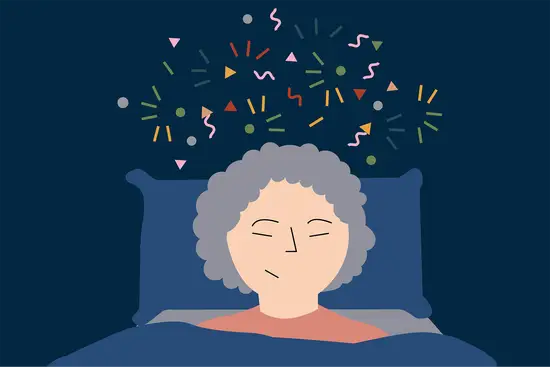Key points
Working shifts can affect your sleep, but there’s some simple techniques that can help you to maintain your physical, mental and emotional health as a shift worker. In this article, we discuss:
- why your sleep can be affected by shift work
- how you can limit the impact of shifts on your sleep
- how to ensure you have the perfect post-shift sleep environment
- lifestyle factors that can have an influence on your sleep
- treatment options if your shifts are having a serious impact on your sleep.
Introduction
According to the latest figures from the Office of National Statistics (ONS), somewhere around 14% of the UK population are now employed in some form of shift work.1
Across the whole globe, the number of people working non-traditional work patterns (outside of the traditional 9-5) appears to be rising, but the downside to this is that irregular work patterns can really affect sleep.
Some people may find working shifts easier than others
While some people may find shift work a breeze that doesn’t affect their sleep too much, but others may not. There’re many factors that influence how an individual will respond to working shifts, which can include their age, physical and mental wellbeing, lifestyle and the very nature of the work they’re undertaking.
For example, it’s often easier to work shifts in your 20s and 30s because your sleep is more resilient the younger you are. Fast forward to your 40s and it can become more difficult to cope with frequent changes to shift patterns.
Similarly, the type of shifts you work can affect your sleep differently. Some people may always work the same shifts, some people occasionally work shifts, others work rotating shift patterns.
Your health, both mental and physical, will also influence your sleep while working shifts so it’s clear that there’s a lot of variables at play here.
Fortunately, we’ve got plenty of advice of tips for you that can help you to maintain your physical, mental and emotional health when working shifts.
We’ll start with a quick overview of why sleep and shift work don’t always go hand-in-hand.
Do you work shifts and feel like you’re not getting enough sleep?
Shift workers are at higher risk of sleep deprivation than the general public and this can put them at higher risk of developing insomnia. If you’re worried about your sleep or would like to know how to improve your sleep as a shift worker, get in touch with us today. Sleepstation has worked with thousands of people with many different shift patterns to help them get the sleep they need.
Shift work and circadian rhythms
Your body runs on an approximate 24 hour cycle that’s regulated by your body clock. Deep inside your brain is a group of cells that are considered to be your body’s personal clock, responsible for keeping everything running on schedule.
This 24 hour cycle that the clock keeps to is what’s known as a circadian rhythm. There’s many of these 24 hours cycles occurring at the same time across the body, all controlled by their own clocks.
These cycles are responsible for regulating everything from when we feel hungry, to how our temperature fluctuates during the day. Virtually all processes in the body run on these 24 hours schedules
All of these different cycles are kept on track by the master clock in the brain, which itself is set by daylight. As soon as daylight enters your eyes in the morning, signals are sent to the master clock.
The master clock relays the signal that it’s daytime to all the other clocks in the body and the many circadian rhythms in the body are reset.
How does this relate to shift work? When people work shifts, they might not necessarily be waking up to daylight and going to sleep in the evening. This can mean that their waking hours can be out of sync with their natural circadian rhythms.

A good example here is the hormone, melatonin. The normal rhythm of melatonin is that levels of it rise in the evening, as light levels drop. This increase in melatonin signals to our brain that it’s time to get sleepy and prepares us for sleep.
Levels of melatonin remain high during the night and then sunlight entering our eye in the morning signals to the body to stop producing melatonin and we no longer feel sleepy.
In somebody working, say, a nightshift, then this ‘normal’ pattern of melatonin production would be at odds with their routine. They would be going to work when melatonin levels should be telling them it’s time to get sleepy and they would be then trying to get to sleep in the daylight hours when melatonin levels are low.
This is a great example of how shift working and circadian rhythms often don’t go well together and it’s only one of many pathways that can be disrupted by shift work.
So what’s the solution? You might be wondering how you can work shifts and still get the sleep you need. Thankfully there are many simple lifestyle tweaks that can help you to sleep well as a shift worker.
There’re also a few things that may be negatively affecting your sleep that you might not realise are having an effect. We’ll go into those in further detail, too.
Let’s get started with a look at how your sleep environment can have a huge effect on your sleep.
Your bedroom could be keeping you awake
To sleep well your bedroom needs to be dark, quiet and cool. It’s one of the most important factors for good quality sleep, whether you work shifts or not.
To achieve darkness during daylight hours, you might want to fit heavy curtains or blackout blinds. If this isn’t possible, an eye mask can help. Whether you work shifts or not, it’s advisable to limit your exposure to screens in the run-up to bedtime.
Screens emit blue light, which can interfere with your melatonin production. As a shift-worker this seems doubly important, so try not to scroll through social media feeds or indulge in a bit of Netflix before you sleep.
It’s also a good idea to cover up any light sources within the bedroom, such as the standby light on a TV or charger lights. Creating a dark environment will help to signal to your brain that it’s sleep time.
You want your sleep environment to be as noise-free as possible. This can be difficult if you’re sleeping during the daytime as day is naturally noisier than the night. You could consider using earplugs if you need to sleep during the day.
Reinforcing what we’ve mentioned above, keeping your electronic devices out of your bedroom will also ensure your bedroom remains quiet. Put your phone on silent and make sure to also switch off alerts and notifications before you try to sleep.

Talk to your partner, children or housemates to make sure they understand that it’s important that you sleep well after a night shift. These chats can help reduce noise levels in the house if/when you are trying to sleep during the day.
You could consider putting a ‘do not disturb’ note on the front door explaining that you are working shifts, and that you should only be disturbed if the matter is urgent.
Your bedroom also needs to be on the cooler side for good sleep. Your core body temperature is another aspect that follows a circadian rhythm, rising and falling across a 24 hour cycle.
Sleep is actually triggered by a drop in body temperature – to get good sleep, you need to lose approximately one degree of body temperature.2
We cool down naturally during the night but your body temperature is higher during the day. So to sleep during the day you need to reduce your body temperature. You can encourage this by:
- watching what you eat. Avoid eating big, sugary, fatty meals before sleep as these can raise body temp.
- take a warm shower. The warm water will raise your temp and when you get out of the shower, your temp will then drop. This acts as a trigger to sleep.
- wearing light, cool materials in bed. Materials such as cotton will keep you cooler in bed.
What you eat and drink can influence your sleep
Poor sleep and shift work can increase the desire for sugary and fatty foods. If your workplace doesn’t offer healthy food, then plan to bring something nutritious with you to work to resist the temptation to eat sweet and fatty foods.
As we’ve mentioned above, sweet and fatty foods can also raise your body temperature, so you’ll want to avoid these close to bedtime anyway. You should also pay attention to what you’re drinking.
Many shift workers rely on caffeinated drinks to stay awake and work efficiently during the night. This strategy can make it more difficult to fall asleep once the shift has finished.
How the body processes caffeine varies from person to person, but a general rule of thumb is to avoid caffeinated drinks at least five hours before your intended bedtime.
Shift workers should also avoid drinking alcohol as a way to help them get to sleep. The problem with alcohol in this situation is that it may help you to fall asleep, but alcohol will affect the quality of sleep.
It can make staying asleep harder, so it’s definitely something that all of us, but especially shift workers, shouldn’t rely on.

Planning meals around shifts
People who work a standard 9 to 5 day usually wake up a couple of hours before the start of their shifts. After finishing their day’s work they may come home and have dinner and then it’s several hours before they go to sleep, during which time they should be relaxing and winding down before bed.
When you work rapidly rotating shifts, this sort of pattern is rarely possible. Following a night shift, the temptation might be to eat dinner at breakfast time and then try to fall asleep almost immediately.
It’s hard enough to sleep during daylight hours, but the usual advice is to avoid a large meal for 3-4 hours before bed because the work involved in digesting a meal will disturb your sleep.
If you can’t avoid going to bed immediately after a night shift because you’re sleepy, then consider a light snack before you sleep and save the big meal for when you wake.
Use light to your advantage
As we’ve discussed in the introduction, light is a key signal that our bodies use to regulate the body clock.
When you’re working shifts, you want to keep in mind that light is what you need when you’re awake and working and dark is what you should strive for when you need to sleep.
So when you’re working and need to keep awake and focussed, keep your work environment as bright as possible. When you finish your shift and are back home getting ready to sleep, try to keep your environment dimly lit.
Similarly, when you finish a night shift and travel home, try to limit how much time you spend exposed to sunlight. We’ve said it earlier but avoid spending too much time looking at blue-lit screens, too.
Conversely, when you’re coming off shifts and want to get back to a regular day/night schedule, try to get exposure to sunlight as early as possible in your day, to help your body clock transition to a natural day/night schedule.
Transitioning between shifts
If you work irregular or rotating shift patterns, transitioning between them may be difficult. There are some simple ways to manage this.
If you feel sleepy then go to sleep, whatever time this may be. There is no point trying to go to sleep if you aren’t sleepy. Equally, if you’re sleepy then your body and brain want to sleep. The critical thing is to listen to your body.
Don’t expect to switch from night shift to a typical day. For the first day of your rest period you’ll need to get some sleep during the day. The more hours you try to switch at any one time, the harder it’ll be to adjust.
When moving from a day to a night shift, it may be helpful on the day before starting a block of nights to try and have a long period of sleep in the late afternoon or early evening.
Sleep loves routine
Which is all well and good, but how do shift workers achieve routine? Whether you work the same shifts or rotating shifts, if you can create even a small level of consistency in how you wind down before bed, this can encourage sleep.
Something as simple as always taking a shower, reading a page of a book, meditating or putting a drop of lavender on your pillow can all help your brain to make the link between the action and the fact that it’s time for you to sleep.
Your personal wind-down routine can be as simple or as complex as you wish or have time for.
Napping and the body clock
A correctly set body clock is the most critical factor in ensuring good sleep and proper functioning during the day. Within the limits of what’s possible, given work patterns and domestic routines, shift workers should try to be as regular in their sleeping patterns as possible.
Naps shouldn’t be part of the shift worker’s overall sleep strategy ― they should be used as a ‘last resort’ to catch up on essential sleep. A short sleep may help in the afternoon or evening before a first night shift but, otherwise, it’s best to plan for sleep so that you can avoid naps ― if you possibly can.
Unless you are on a rapidly rotating shift pattern it’s probably best to avoid napping during the ‘lunch break’ of a night shift. Naps confuse the body clock and can make it harder to sleep well.
In addition, if you nap regularly, you’ll probably suffer from ‘sleep inertia’ which is the feeling of grogginess that people experience after being awoken from a short sleep.3
Shift work can affect your health
Ensuring you get enough good-quality sleep is absolutely essential for maintaining your mental and physical wellbeing. It’s well-established that poor sleep is associated with an increased risk of developing diabetes, heart disease and obesity and has also been linked with development of cancer.
Sleep and mental health are likewise interlinked. Not getting enough sleep can increase symptoms of stress, anxiety and depression, and experiencing any or all of these can affect how well you sleep.
So taking care of our sleep should be a high priority for all of us and especially those who work shifts. Shift workers often experience sleep deprivation and are known to be at higher risk of developing insomnia than the general public.4
Shift workers can also develop a disorder known as shift work sleep disorder (SWSD), which is thought to affect some 10-40% of shift workers and commonly goes undiagnosed.5

Symptoms of SWSD can include insomnia and daytime sleepiness that interferes with daily life. People with this disorder may also experience depression, irritability, headaches, concentration problems and lack of energy.
These are all classic signs of sleep deprivation. So it’s essential that, as someone who works shifts, you make sleep your priority. If you feel that you may be experiencing SWSD, then speak to your healthcare provider, or get in touch with us here at Sleepstation.
We’ve worked with shift workers across diverse backgrounds and our course of Cognitive Behavioural Therapy for insomnia (CBTi) has been clinically validated to improve sleep.
If your work pattern is affecting your health and wellbeing then you need to take steps to limit its effects. Take the first step today by answering our short questionnaire to see how Sleepstation can help you.
Conclusions
There are some simple strategies that you can apply to make getting enough good quality sleep around shift work easier. After a long shift, it can be easy to slip back into old habits if you don’t have a plan, so it’s important to plan ahead.
You don’t need to change everything at once. As a starting point, make sure to:
- keep your bedroom cool, dark and quiet
- wind down properly before bed
- avoid large meals before bed
If you’ve followed all of the guidance outlined above and you’re still struggling with your sleep, then please get in touch to let us know more about your problem so that we can help.
Summary
- Shift workers are at increased risk of not getting enough sleep.
- Ensure your sleep environment is cool, dark and quiet.
- Pay attention to what you eat and drink when you’re working shifts.
- A wind-down routine can help your mind and body know when sleep is approaching.
References
- Shift workers in the public sector – Office for National Statistics [Internet]. Ons.gov.uk. 2022 [cited 22 February 2022]. Available here. ↩︎
- Barrett, J., Lack, L. and Morris, M., 1993. The sleep-evoked decrease of body temperature. Sleep, 16(2), pp.93-99. ↩︎
- Hilditch CJ, McHill AW. Sleep inertia: current insights. Nat Sci Sleep 2019; 11: 155–165. ↩︎
- Brito RS, Dias C, Afonso Filho A, Salles C. Prevalence of insomnia in shift workers: a systematic review. Sleep Sci 2021; 14: 47–54. ↩︎
- 3 Pallesen S, Bjorvatn B, Waage S, Harris A, Sagoe D. Prevalence of shift work disorder: A systematic review and meta-analysis. Front Psychol 2021; 12: 638252. ↩︎


